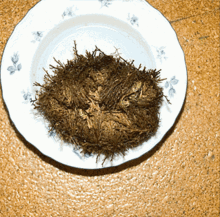| Revision as of 11:24, 3 January 2024 editFlora and fauna man (talk | contribs)Extended confirmed users1,855 edits Updating name of speciesTag: Visual edit← Previous edit | Latest revision as of 12:22, 29 July 2024 edit undoPlantsurfer (talk | contribs)Extended confirmed users40,032 edits Reverted 1 edit by 117.204.122.208 (talk): Inaccurate and lacking reliable sourceTags: Twinkle Undo | ||
| (3 intermediate revisions by 3 users not shown) | |||
| Line 9: | Line 9: | ||
| * '']'', members of the Linderniaceae/Scrophulariaceae with snapdragon-like flowers | * '']'', members of the Linderniaceae/Scrophulariaceae with snapdragon-like flowers | ||
| * '']'' | * '']'' | ||
| * '']'', a symbiosis that can survive |
* '']'', a symbiosis that can survive extreme ],<ref>{{cite web|url=http://faculty.ucc.edu/biology-ombrello/pow/resurrection_plant.htm |title=Resurrection Plant |publisher=Faculty.ucc.edu |date= |accessdate=2012-01-30}}</ref> | ||
| * '']'', the plant can revive within a short period of time after a drought | * '']'', the plant can revive within a short period of time after a drought | ||
| * '']'', a plant species native to Southern Africa | * '']'', a plant species native to Southern Africa | ||
| Line 16: | Line 16: | ||
| * '']'', a plant species native to North America, Central and South America, and sold as a novelty | * '']'', a plant species native to North America, Central and South America, and sold as a novelty | ||
| * '']'' | * '']'' | ||
| * '']'', a monocotyledonous genus typically occurring on rock outcrops in Southern African grasslands | * '']'', a monocotyledonous genus of 57 species<ref name=POWO>{{cite web|work=Plants of the World Online |title=Xerophyta Juss. |url=https://powo.science.kew.org/taxon/urn:lsid:ipni.org:names:1681-1 |publisher=Royal Botanic Gardens, Kew |access-date=25 May 2024 }}</ref> typically occurring on rock outcrops in Southern African grasslands | ||
| Certain resurrection plants have long been sold in their dry, "lifeless" form as curiosities. |
Certain resurrection plants have long been sold in their dry, "lifeless" form as curiosities. This custom was noted by many 19th-century authors, and continues today. | ||
| In December, 2015, resurrection plants were featured in a ] given by Professor ] | In December, 2015, resurrection plants were featured in a ] given by Professor ] | ||
Latest revision as of 12:22, 29 July 2024
A resurrection plant is any poikilohydric plant that can survive extreme dehydration, even over months or years.

Examples include:
- Anastatica hierochuntica, also known as the Rose of Jericho, a plant species native to deserts of North Africa
- Asteriscus (plant);
- Dorcoceras hygrometrica,
- Craterostigma, members of the Linderniaceae/Scrophulariaceae with snapdragon-like flowers
- Haberlea rhodopensis
- Lichen, a symbiosis that can survive extreme desiccation,
- Mesembryanthemum, the plant can revive within a short period of time after a drought
- Myrothamnus flabellifolius, a plant species native to Southern Africa
- Pleopeltis polypodioides, also known as resurrection fern
- Ramonda serbica, a species in the family Gesneriaceae
- Selaginella lepidophylla, a plant species native to North America, Central and South America, and sold as a novelty
- Tillandsia
- Xerophyta, a monocotyledonous genus of 57 species typically occurring on rock outcrops in Southern African grasslands
Certain resurrection plants have long been sold in their dry, "lifeless" form as curiosities. This custom was noted by many 19th-century authors, and continues today.
In December, 2015, resurrection plants were featured in a TED talk given by Professor Jill Farrant , Molecular and Cell Biology, University of Cape Town, South Africa, who performs targeted genetic modification of crop plants to make them tolerate desiccation by activating genes that are already there but not natively expressed in response to drought.
See also
References
- Liberty Hyde Bailey (1916). The Standard Cyclopedia of Horticulture. Vol. 5. The Macmillan company. pp. 2920–2921, 3639.
- Zhang, T.; Fang, Y.; Wang, X.; Deng, X.; Zhang, X.; Hu, S.; Yu, J. (2012). Badger, Jonathan H (ed.). "The Complete Chloroplast and Mitochondrial Genome Sequences of Boea hygrometrica: Insights into the Evolution of Plant Organellar Genomes". PLOS ONE. 7 (1): e30531. Bibcode:2012PLoSO...730531Z. doi:10.1371/journal.pone.0030531. PMC 3264610. PMID 22291979.
- "Resurrection Plant". Faculty.ucc.edu. Retrieved 2012-01-30.
- "Xerophyta Juss". Plants of the World Online. Royal Botanic Gardens, Kew. Retrieved 25 May 2024.
- "TED Speaker: Jill Farrant". TED.com. Retrieved 2016-01-21.
- "TED Talk: How we can make crops survive without water". TED.com. Retrieved 2016-01-21.
If an internal link led you here, you may wish to edit the linking article so that it links directly to the intended article.
This plant physiology article is a stub. You can help Misplaced Pages by expanding it. |